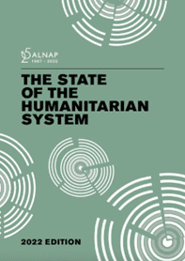
Report finds ‘Do no digital harm’ has emerged as an important humanitarian imperative, following contributions from PRIO project.
The latest State of the Humanitarian System Report 2022 by ALNAP has been released, providing an assessment of the size, shape and performance of the humanitarian system from 2018 to 2021.
The 2022 edition includes contributions from a number of NCHS associates as part of the Peace Research Institute Oslo (PRIO) project 'Do no harm: Ethical humanitarian innovation and digital bodies.'
The report finds that with crisis-affected populations often required to provide personal data to aid agencies in exchange for assistance and with little control over their data, 'do no digital harm' has emerged as an important humanitarian imperative (page 196).
Contributors from the 'Do no harm' project include Kristin Bergtora Sandvik (Research Professor, PRIO and Professor, University of Oslo), Larissa Fast (Professor and Executive Director, Humanitarian and Conflict Response Institute, University of Manchester), Katja Lindskov Jacobsen (Senior Researcher, Centre for Military Studies) and Maria Gabrielsen Jumbert (Senior Researcher and Research Director, PRIO and NCHS Co-Director).
Other notable takeaways include that while international humanitarian assistance has nearly doubled over the past decade, only 36% of aid recipients surveyed thought that aid went to those who needed it most. Threats to humanitarian space also remain a major barrier to reaching populations, with a 54% rise in aid worker attacks over the study period. For more findings, the full 2022 report can be accessed here and a reader's guide to the report accessed here.
The State of the Humanitarian System is a recurring report first published by ALNAP in 2010. The report is updated every two or three years based on evidence collected from on-the-ground practitioners, crisis-affected populations, academics, policy makers and donors.
ALNAP (Active Learning Network for Accountability and Performance) is a non-profit organisation with the aim to increase and accountability in the humanitarian aid sector.





